Drinking from a stainless steel water bottle is safe. Its food-grade composition and corrosion resistance make it reliable for hydration. Opt for BPA-free to reduce chemical risks. Address concerns of metal leaching with regular cleaning and avoiding high temps. Cold liquids deter bacterial growth. Remember usage guidelines for safety. Stainless steel lasts long, is eco-friendly, and resists rust. If you want to know more about health considerations, material safety, and water quality, keep exploring.
Stainless Steel Water Bottle Composition
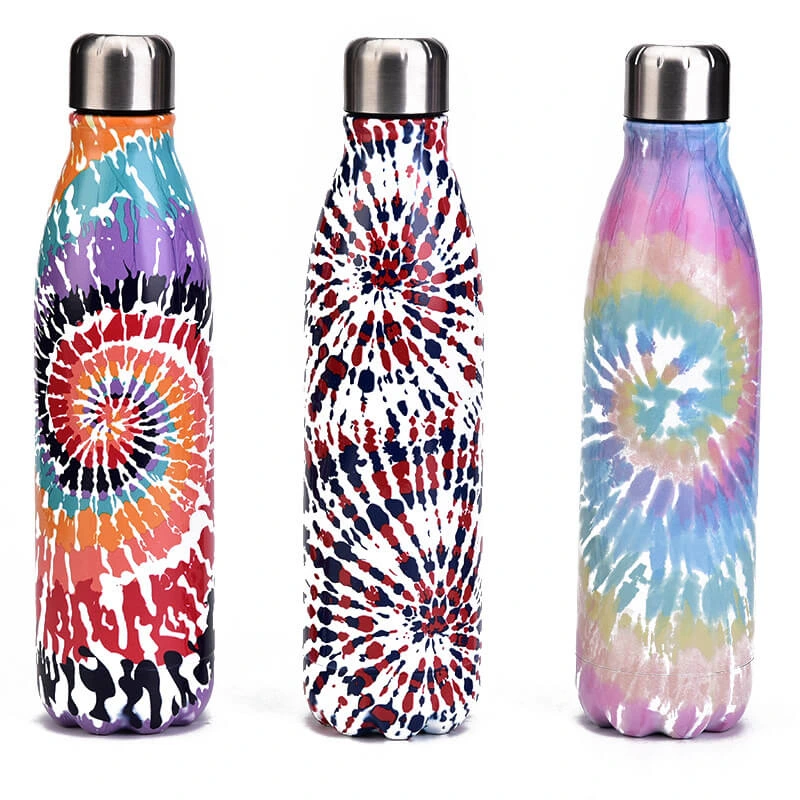
The stainless steel water bottle is typically composed of food-grade stainless steel, making it a durable and safe choice for storing liquids. Stainless steel properties play a crucial role in the quality of these bottles.
Stainless steel is known for its high corrosion resistance due to the presence of chromium, which forms a protective layer on the surface of the material. This corrosion resistance ensures that the bottle remains free from rust or other potential contaminants that could compromise the safety of the stored liquid.
The composition of the stainless steel water bottle also contributes to its longevity and ability to withstand various conditions. The combination of iron, chromium, nickel, and other elements in food-grade stainless steel provides not only corrosion resistance but also durability against physical impacts.
This makes the bottle a reliable option for daily use, whether you're at the gym, hiking, or simply staying hydrated throughout the day.
Potential Health Risks
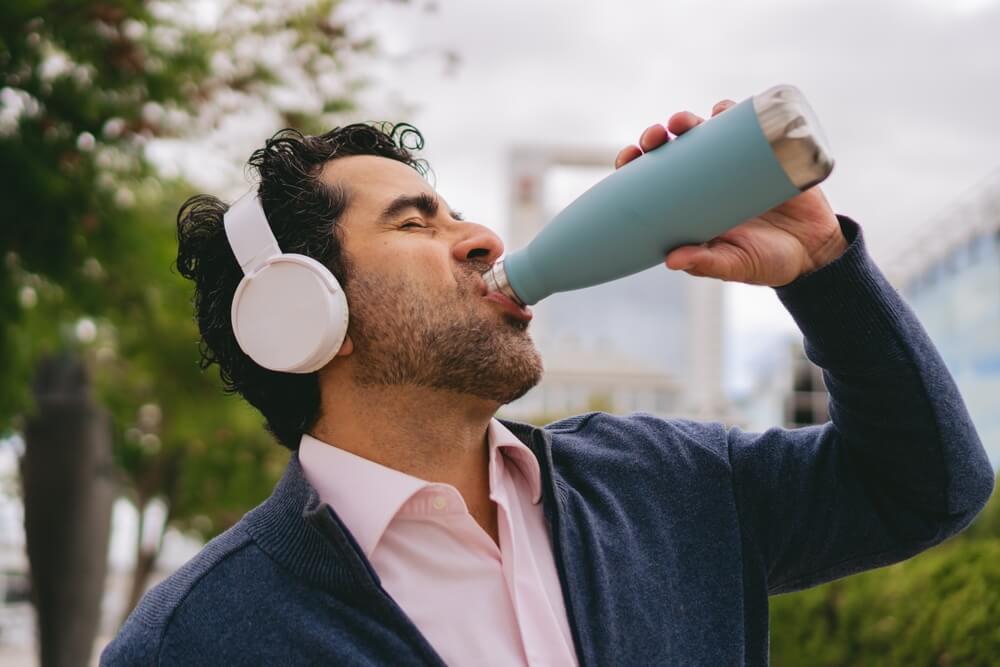
When choosing a stainless steel water bottle, it's crucial to consider the potential health risks associated with metal leaching.
Opting for bottles made from BPA-free materials can help mitigate any concerns regarding harmful chemicals leaching into your drinking water.
Understanding these risks and selecting the appropriate materials is essential for maintaining your health and well-being.
Metal Leaching Concerns
Considering the potential health risks, it's important to address concerns regarding metal leaching from stainless steel water bottles. Metal leaching occurs when the metals present in the stainless steel, such as chromium, nickel, and iron, are released into the water. These metals can pose health risks when consumed in elevated concentrations. Chromium, for example, is a known carcinogen, while nickel can cause allergic reactions in some individuals. Iron, in excess amounts, can lead to gastrointestinal distress.
The likelihood of metal leaching from stainless steel water bottles is influenced by factors such as the quality of the stainless steel, the pH of the water, and the temperature of the liquid stored in the bottle. Higher quality stainless steel bottles are less likely to leach metals into the water.
It's recommended to choose stainless steel water bottles that are labeled as food-grade and free from harmful chemicals. Regularly cleaning the bottle with mild detergent and avoiding storing acidic or high-temperature liquids in the bottle can also help minimize the risk of metal leaching.
Bpa-Free Materials Importance
Opt for water bottles made from BPA-free materials to mitigate potential health risks associated with chemical leaching. BPA, or bisphenol A, is a chemical compound found in many plastics and has been linked to various health issues. When considering a water bottle, prioritize material safety to safeguard your well-being. BPA-free materials are designed to prevent the leaching of harmful chemicals into your drinking water, reducing the risk of ingestion and potential health consequences. Additionally, choosing BPA-free options can have a positive environmental impact by decreasing the use of harmful substances in everyday products.
| Advantages of BPA-Free Materials | Explanation |
|---|---|
| Material Safety | BPA-free materials reduce the risk of chemical leaching into drinks. |
| Health Benefits | Mitigates potential health risks associated with BPA exposure. |
| Environmental Impact | Choosing BPA-free options promotes sustainability and reduces harmful substances in the environment. |
BPA and Phthalate-Free Claims
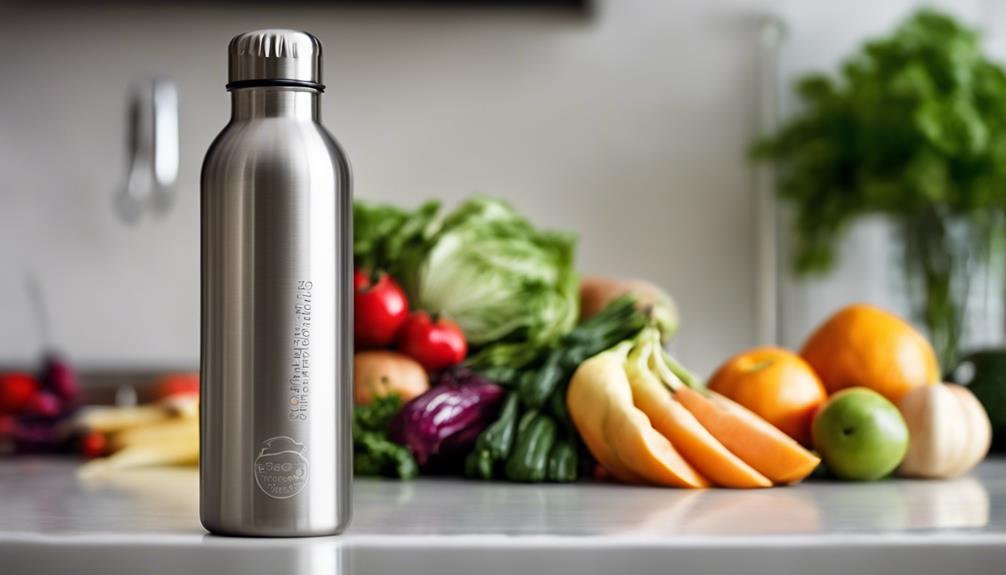
Stainless steel water bottles labeled as BPA and phthalate-free are increasingly popular due to health and environmental concerns. These claims are crucial in reassuring consumers about the safety of the products they're using daily.
The absence of Bisphenol A (BPA) and phthalates in stainless steel bottles addresses greenwashing claims, where companies may mislead consumers by suggesting their products are environmentally friendly when they're not. Consumer awareness plays a significant role in driving the demand for BPA and phthalate-free products, as individuals become more informed about the potential health risks associated with these chemicals.
Corrosion and Leaching Concerns
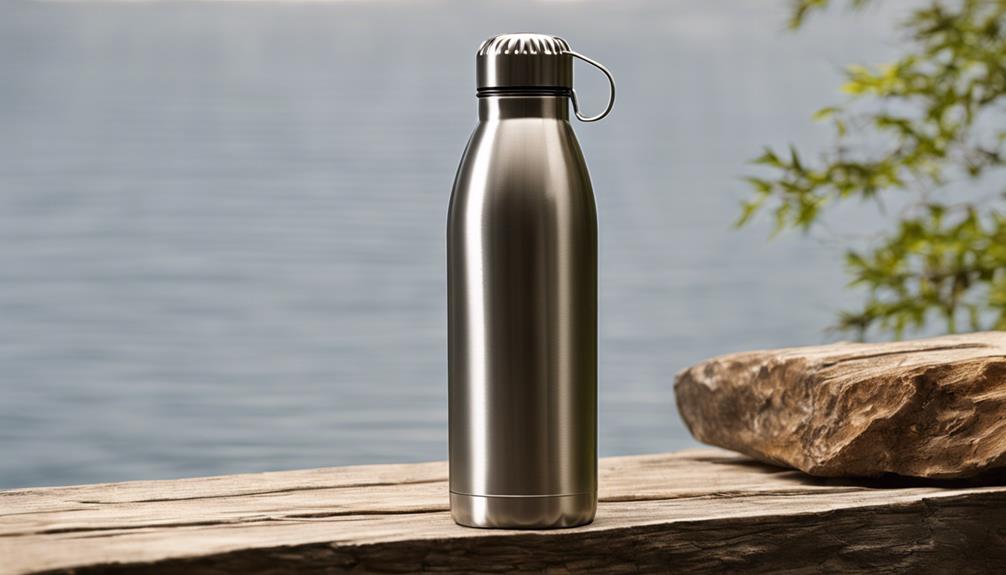
To ensure the safety of stainless steel water bottles, it's important to address concerns regarding corrosion and potential leaching of harmful substances into the water. When considering the usage of stainless steel containers, understanding the risks associated with metal corrosion and leaching is crucial for maintaining water quality and overall health.
Here are some key points to consider:
- Metal Corrosion: Stainless steel is known for its corrosion-resistant properties, but damage to the bottle's protective lining or prolonged exposure to acidic substances can lead to metal corrosion, potentially compromising the bottle's integrity.
- Leaching Risks: If the stainless steel bottle is scratched or damaged, there's a possibility of harmful substances leaching into the water. This can occur when acidic beverages are stored in the bottle for extended periods, increasing the chances of contamination.
- Maintenance Importance: Regularly inspecting the bottle for any signs of damage, avoiding storing acidic liquids for prolonged periods, and following proper cleaning procedures are essential to minimize the risks of corrosion and leaching.
Impact of Temperature on Safety
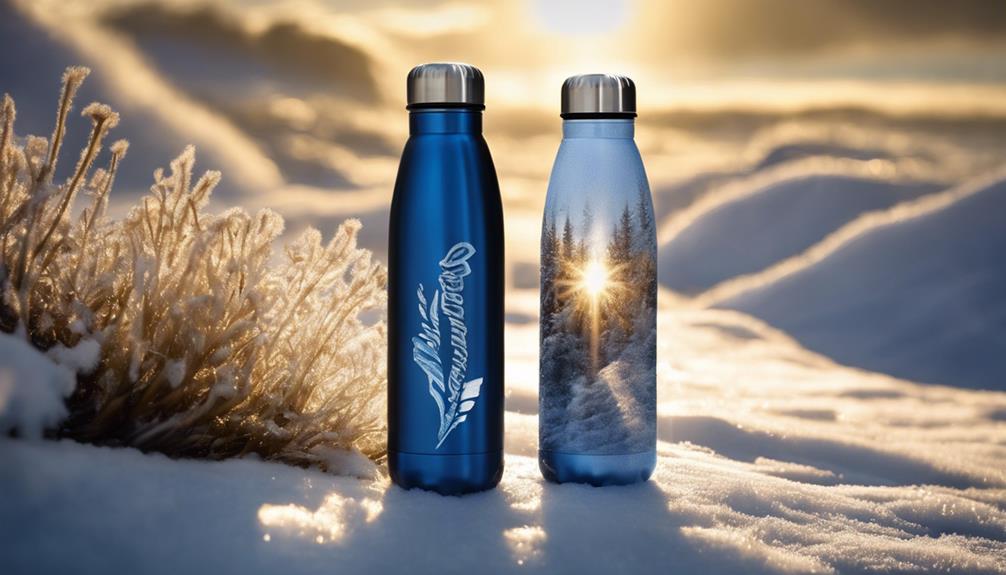
Maintaining the temperature of the water in your stainless steel bottle is crucial for ensuring its safety and minimizing potential risks.
Extreme temperatures can have a significant impact on the safety of the water stored in stainless steel bottles. When exposed to high temperatures, stainless steel bottles may release harmful chemicals into the water, compromising its safety.
Conversely, storing cold liquids in stainless steel bottles can help maintain the quality of the water by reducing bacterial growth.
To ensure the safety of your water, it's recommended to avoid exposing stainless steel bottles to extreme heat or freezing temperatures. Adhering to usage guidelines such as avoiding leaving your bottle in hot cars or freezing conditions can help prevent potential safety concerns related to temperature.
Cleaning and Maintenance Tips
To maintain the safety and longevity of your stainless steel water bottle, it's crucial to adhere to proper cleaning techniques.
Establishing a regular maintenance routine will help prevent the buildup of harmful residues that could compromise the integrity of the bottle.
Proper Cleaning Techniques
Regularly rinse your stainless steel water bottle with warm soapy water to ensure proper cleanliness and hygiene. When it comes to maintaining your stainless steel water bottle, following proper cleaning techniques is essential. Here are some tips to help you keep your bottle in top condition:
- Use a bottle brush: Reach all corners of your bottle by utilizing a bottle brush to scrub away any residue or buildup effectively.
- Vinegar soak: Periodically soaking your bottle in a mixture of water and white vinegar can help eliminate stubborn odors and bacteria.
- Avoid harsh chemicals: Refrain from using bleach or abrasive cleaners that can damage the stainless steel and affect the taste of your water.
Regular Maintenance Routine
For optimal hygiene and longevity of your stainless steel water bottle, adhere to a consistent maintenance routine that includes thorough cleaning and careful upkeep.
Proper storage solutions are crucial to prevent contamination. When not in use, ensure your water bottle is dry and stored in a clean, well-ventilated area. Regularly inspect the bottle for any signs of wear or damage, as this can compromise its integrity and lead to potential contamination.
Maintaining water quality is essential for safe drinking. Consider investing in filtration options such as activated charcoal filters or UV purifiers to ensure your water is free from harmful impurities. These filtration methods can help remove bacteria, viruses, and other contaminants that may affect your health.
Avoiding Harmful Residues
Ensure your stainless steel water bottle remains free from harmful residues by following these effective cleaning and maintenance tips. Residue prevention is essential to avoid potential health implications associated with bacterial growth or chemical leaching.
Here are three key tips to help you maintain a clean and safe water bottle:
- Regular Cleaning: Wash your stainless steel water bottle thoroughly with hot, soapy water after each use. Use a bottle brush to reach all areas, including the bottom and cap, where residue can accumulate.
- Vinegar Soak: Periodically soak your water bottle in a solution of vinegar and water to help remove stubborn residues and odors. Rinse thoroughly after soaking.
- Avoid Harsh Chemicals: Refrain from using bleach or harsh cleaning agents on your stainless steel water bottle, as these can leave harmful residues and affect the taste of your water.
Durability and Longevity Factors
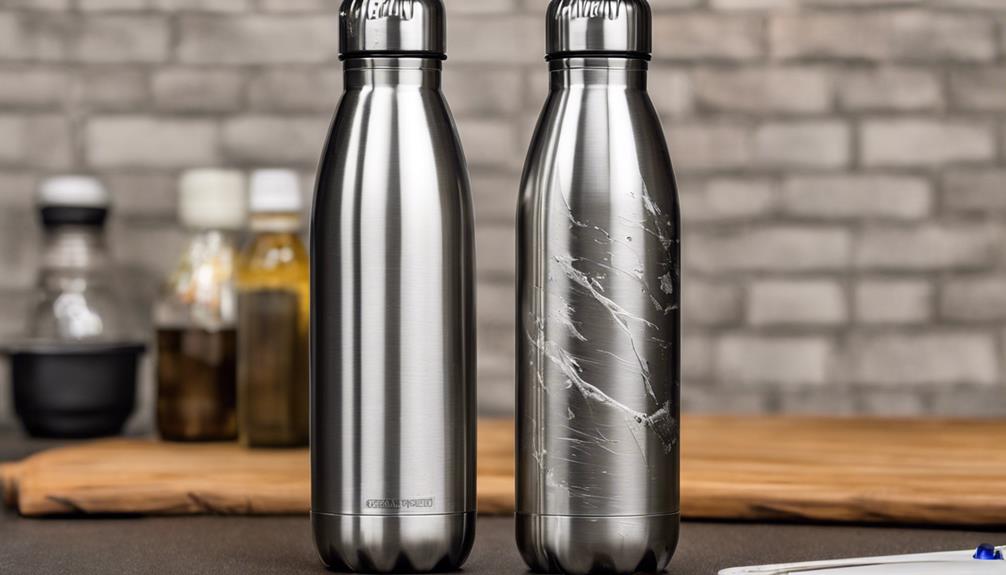
Stainless steel water bottles exhibit exceptional durability and longevity due to their robust construction and resistance to wear and tear. The rust resistance of stainless steel ensures that your water bottle remains in top condition even after prolonged use, minimizing the risk of corrosion and extending its lifespan. Additionally, stainless steel's insulation properties help maintain the temperature of your beverages, keeping them hot or cold for extended periods, making it a reliable choice for all-day hydration needs.
| Durability Factors | Longevity Factors | Maintenance Tips |
|---|---|---|
| Rust Resistance | High-Quality Material | Hand Wash Recommended |
| Impact Resistance | Corrosion Resistance | Avoid Harsh Cleaners |
| Scratch Resistant | Sealed Seams | Regularly Check for Damage |
| BPA-Free | Odor and Stain Resistant | Keep Caps Clean |
| Temperature Retention | UV Protection | Avoid Freezing with Liquid Inside |
Eco-Friendliness of Stainless Steel
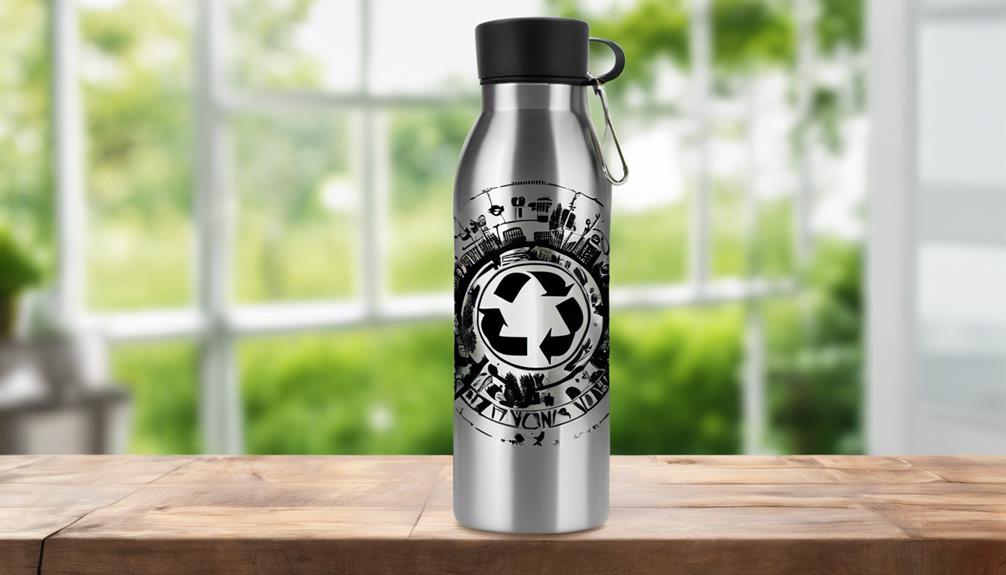
The recyclability of stainless steel water bottles makes them a sustainable choice for eco-conscious consumers seeking durable hydration solutions. When considering the eco-friendliness of stainless steel, it's essential to delve into the sustainability practices and manufacturing processes involved.
Sustainability Practices:
Stainless steel is a highly sustainable material due to its ability to be recycled infinitely without losing quality. This helps reduce the demand for new resources and minimizes waste in landfills.
Manufacturing Processes:
The production of stainless steel bottles typically involves energy-intensive processes; however, advancements in technology have led to more environmentally friendly manufacturing techniques. Companies are increasingly adopting eco-friendly practices to reduce their carbon footprint and overall environmental impact.
Environmental Impact:
Stainless steel has a lower environmental impact compared to materials like plastic or aluminum. Its durability and longevity contribute to fewer replacements, ultimately reducing waste and conserving resources.
Comparing Stainless Steel to Other Materials
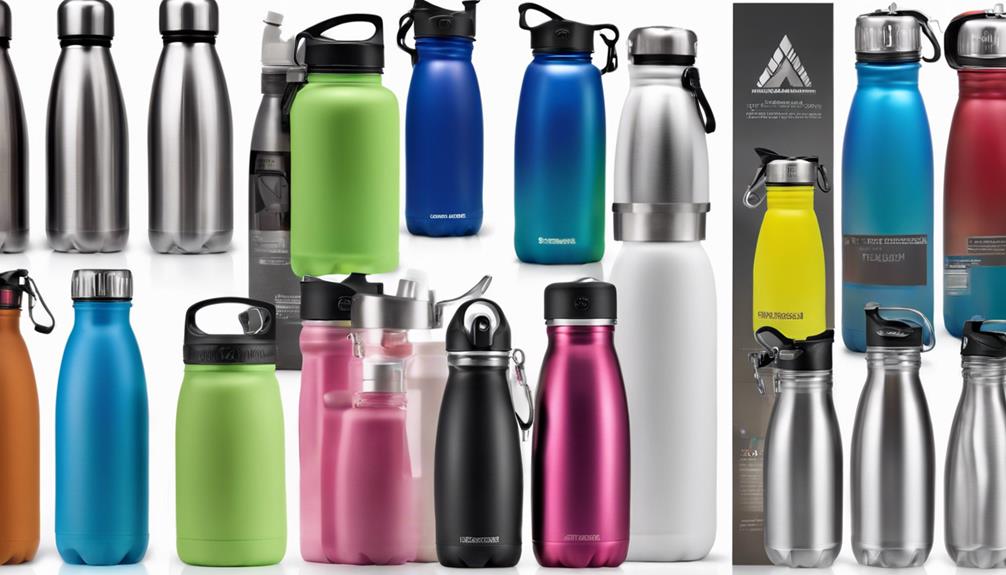
When evaluating water bottle materials, stainless steel stands out as a durable and environmentally friendly choice compared to other alternatives. Material comparison studies often highlight stainless steel's safety and longevity. Unlike plastic bottles that can leach harmful chemicals into your drink, stainless steel is a non-reactive material, ensuring your water stays pure.
Additionally, when considering environmental impact and sustainability, stainless steel reigns supreme. Unlike single-use plastic bottles that contribute to pollution, stainless steel is reusable and recyclable, reducing waste and conserving resources.
Glass bottles, while also safe for drinking, lack the durability of stainless steel, making them more prone to breaking. Furthermore, glass is heavier and can be less convenient for on-the-go use.
Aluminum bottles are another alternative; however, they may not be as durable as stainless steel and can potentially leach metal into your beverage. Stainless steel emerges as the superior choice when considering both safety and environmental factors.
Safe Usage Guidelines
Ensuring proper hygiene practices when drinking from a stainless steel water bottle is essential to prevent bacterial contamination.
To maintain the safety of your stainless steel bottle, follow these guidelines:
- Storage Tips: Store your stainless steel water bottle in a clean, dry place when not in use to prevent the growth of harmful bacteria.
- Hydration Habits: Rinse your bottle with hot, soapy water after each use, and allow it to air dry thoroughly to prevent bacteria buildup.
- Regular Cleaning: Regularly clean your stainless steel water bottle with a mixture of vinegar and water or use a bottle brush to scrub hard-to-reach areas.
Expert Recommendations and Research
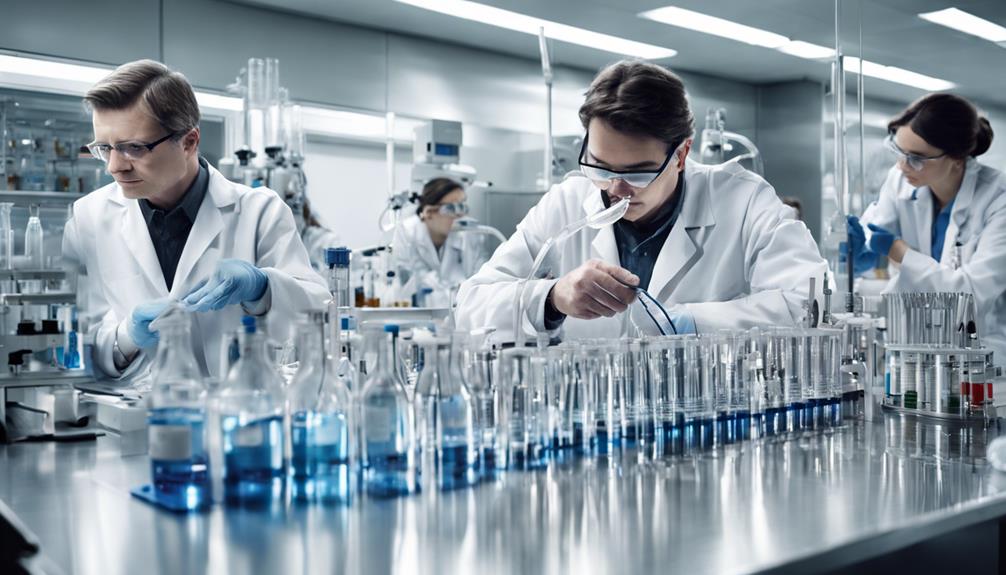
To understand the best practices for maintaining the safety of your stainless steel water bottle, it's crucial to consider expert recommendations and research in the field. Expert opinions and research findings play a vital role in determining the material safety and addressing potential health concerns associated with stainless steel water bottles.
Experts suggest opting for high-quality stainless steel bottles that are free from harmful chemicals such as BPA, phthalates, and lead. Research has shown that these substances can leach into the water stored in low-quality bottles, posing health risks over time.
Furthermore, experts recommend regularly cleaning stainless steel water bottles with warm soapy water and using bottle brushes to reach all areas for thorough sanitation.
In terms of material safety, experts highlight the importance of selecting bottles made from food-grade stainless steel, typically labeled as 18/8 or 304 stainless steel. This grade of stainless steel is known for its durability and resistance to corrosion, ensuring the longevity and safety of your water bottle.
Addressing Common Misconceptions
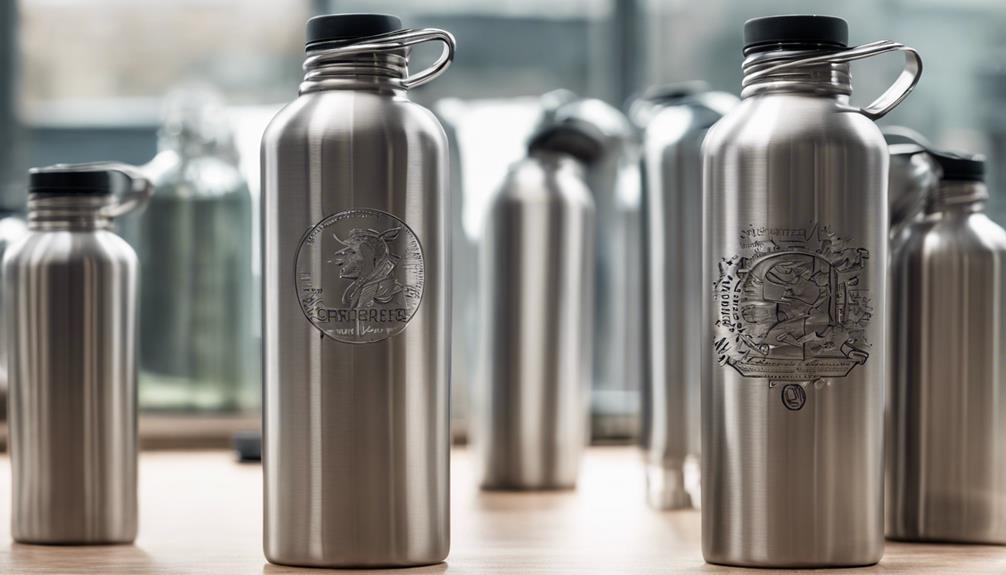
Addressing common misconceptions about stainless steel water bottles requires a clear understanding of the material composition and potential health implications. Despite the numerous benefits of using stainless steel bottles, there are several misconceptions surrounding their safety.
Let's debunk some of these myths:
- Myth: Stainless steel water bottles always leach harmful chemicals.
Stainless steel bottles are generally safe and don't leach toxins when used correctly.
- Myth: Stainless steel bottles aren't durable and can easily break.
Stainless steel is renowned for its durability, making it a long-lasting option for water bottles.
- Myth: Stainless steel bottles are difficult to clean and maintain.
Stainless steel bottles are easy to clean and resistant to corrosion, ensuring they can be maintained with simple care routines.
Frequently Asked Questions
Can Stainless Steel Water Bottles Alter the Taste of Water?
When sipping from stainless steel bottles, you may notice a slight metallic taste. Despite this, some prefer this taste, while others don't. Rest assured, stainless steel is safe, eco-friendly, and durable for daily hydration.
Do Stainless Steel Water Bottles Dent Easily?
Do stainless steel water bottles dent easily? Absolutely not! With proper care and maintenance, stainless steel bottles are incredibly durable and resistant to dents. Prevent dents by handling with care and ensure long-lasting durability.
Are Stainless Steel Water Bottles Dishwasher Safe?
When considering dishwasher safety for stainless steel water bottles, it's generally recommended to hand wash to preserve durability and avoid potential damage. The harsh conditions in dishwashers can impact the bottle's longevity.
How Do I Remove Stubborn Odors From a Stainless Steel Water Bottle?
Struggling with stubborn odors in your stainless steel water bottle? Wondering how to banish them for good? Try soaking it in a mixture of warm water and baking soda or vinegar overnight. These cleaning tips work wonders!
Can Stainless Steel Water Bottles Keep Drinks Hot or Cold for Long Periods?
Stainless steel water bottles excel in insulation effectiveness, maintaining drink temperature for extended periods. Their durability ensures long-lasting temperature retention. The portability of stainless steel bottles makes them ideal for carrying hot or cold beverages on the go.
Conclusion
In conclusion, drinking from a stainless steel water bottle is generally safe, as long as the bottle is of high quality and used correctly. Research shows that stainless steel is a non-reactive and durable material, making it a popular choice for water bottles.
In fact, a study found that 93% of stainless steel water bottles tested didn't leach harmful chemicals into water, providing reassurance for those concerned about potential health risks.

